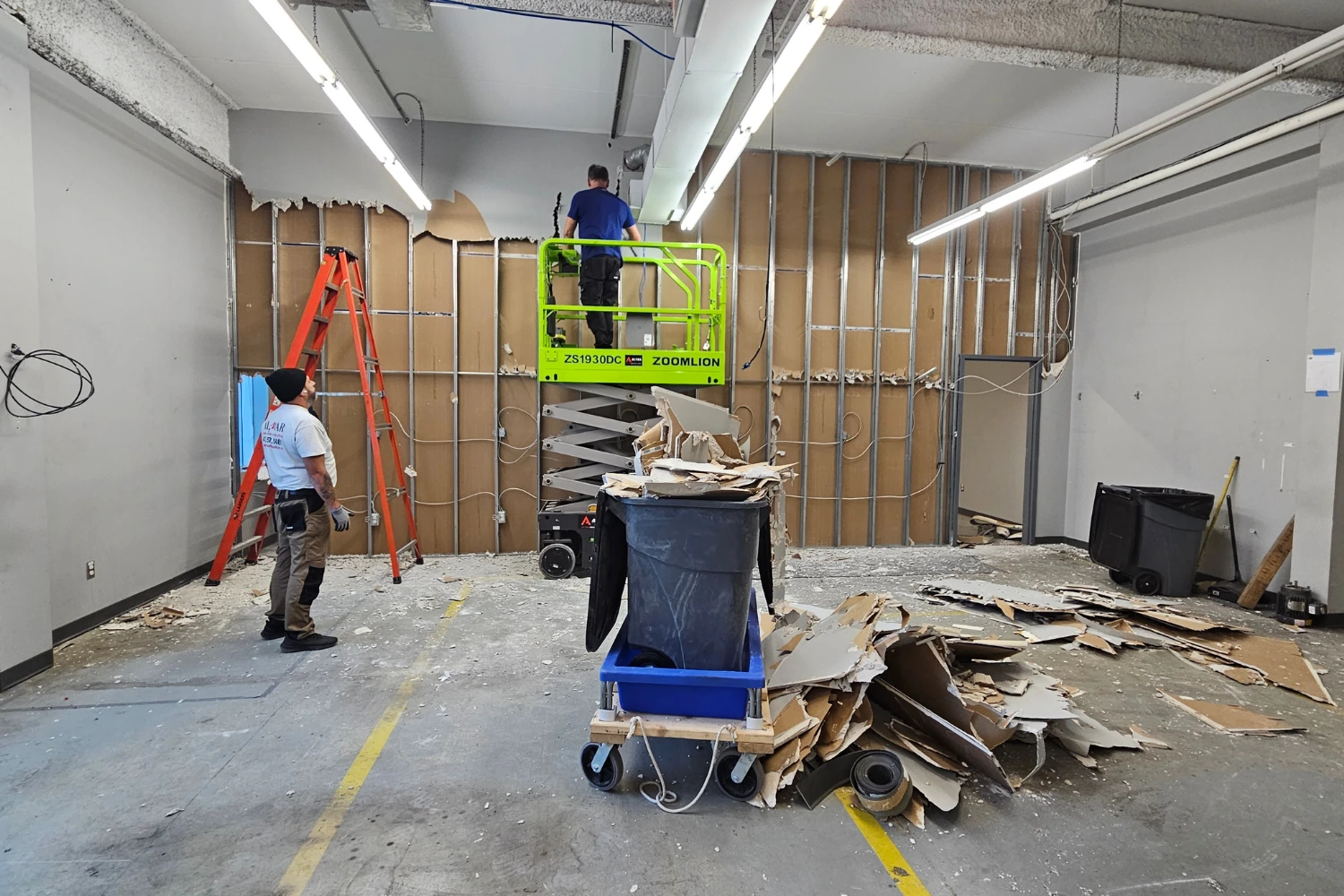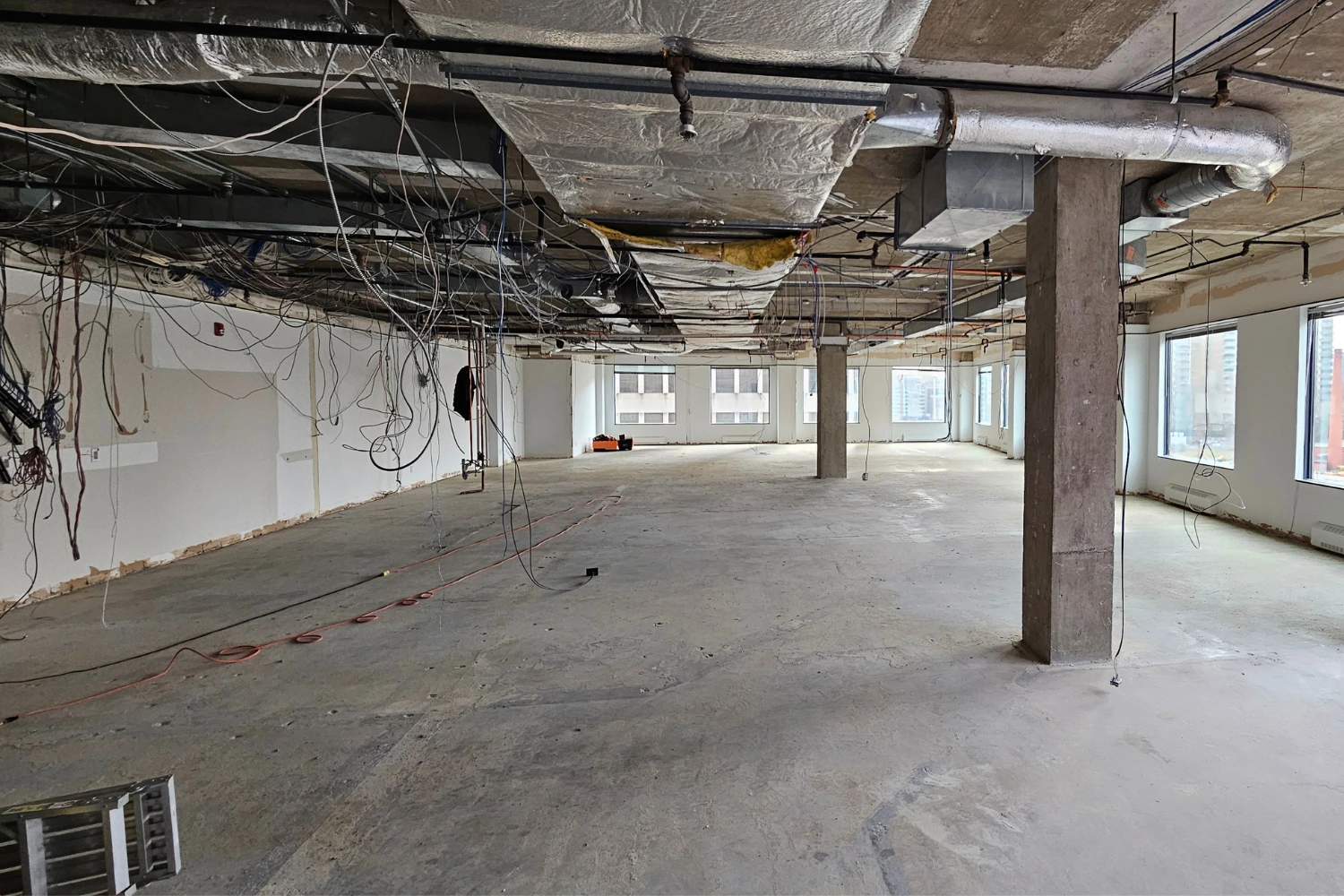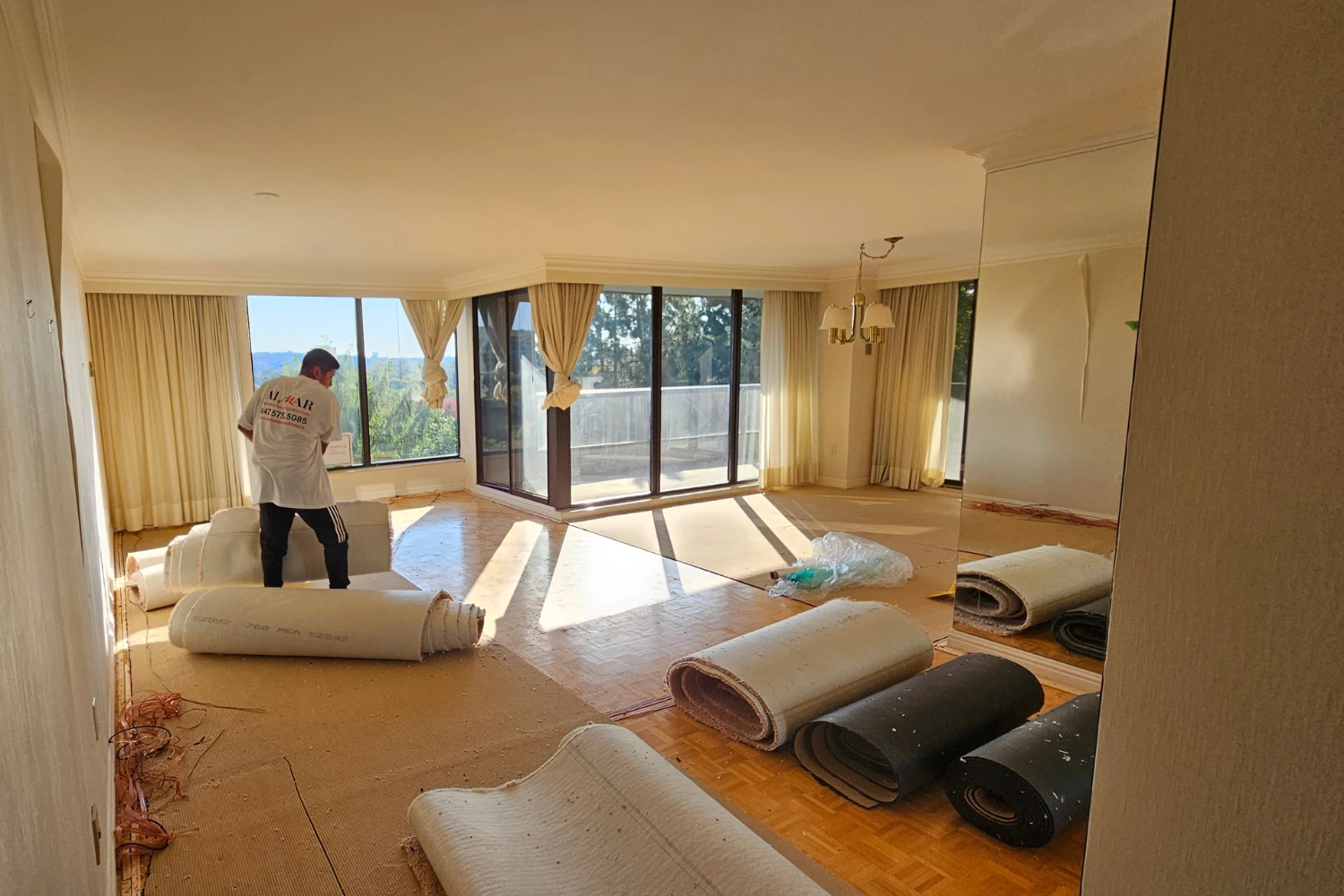Demolishing buildings in downtown Toronto comes with unique challenges due to its dense population, bustling streets, and strict municipal regulations. Before you start tearing down walls or leveling buildings, there are several critical considerations to keep in mind.
Here’s a detailed guide to ensure your demolition project goes smoothly, stays compliant with city laws, and minimizes disruptions.
Table Of Contents:
1. Dumpster Rentals in Downtown Toronto
2. Adherence to Toronto’s Noise Bylaw
3. Filing a ‘Notice of Project’
4. Tree Protection in Downtown Toronto
5. Communication with Neighbours
6. Parking Permits for Workers
7. Building Permit Deposits
8. Coordinating with Toronto’s Construction Hubs
9. Additional Tips for Successful Downtown Demolitions
1. Dumpster Rentals in Downtown Toronto
One of the first logistical challenges in downtown demolition is Toronto waste disposal. In most areas, dumpsters are a necessity; however, placing a dumpster on the street in Toronto requires a Street Occupation Permit. Without one, you’ll need to plan for live loads, where debris is loaded directly into a truck and hauled away.
Street Occupation Permit:
To get this permit, submit your application to the City of Toronto well in advance. Note that permits are not guaranteed, especially in high-traffic areas.
Alternatives: If the permit is denied or impractical, live loads are the best alternative. This requires precise scheduling to ensure trucks are on-site as debris is removed.
2. Adherence to Toronto’s Noise Bylaw
Toronto enforces strict noise regulations to ensure residents aren’t disturbed during odd hours. For construction and demolition:
Permitted Construction Hours in Toronto:
- Weekdays (Monday to Friday): Construction noise is allowed from 7:00 a.m. to 7:00 p.m.
- Saturdays: Permitted from 9:00 a.m. to 7:00 p.m.
- Sundays and Statutory Holidays: No construction noise is permitted.
These regulations are outlined in Chapter 591 of the Toronto Municipal Code.
Noise Exemption Permits:
You can apply for a Noise Exemption Permit for construction activities that must occur outside the standard hours, such as continuous concrete pouring or large crane operations. Submit applications at least four weeks in advance to allow for processing.

3. Filing a ‘Notice of Project’
Before initiating a demolition project in downtown Toronto, it’s essential to determine whether you need to file a Notice of Project (NOP) with the Ministry of Labour, Training and Skills Development. This notification ensures compliance with safety regulations and facilitates oversight to protect workers and the public.
When to File an NOP:
Under Section 6(1) of Ontario’s Regulation for Construction Projects (O. Reg. 213/91), a constructor must submit an NOP prior to starting any project that meets specific criteria, including:
Project Cost:
The total expected cost of labour and materials exceeds $50,000.
Building Specifications:
- Erecting or structurally altering a building more than two storeys or over 7.5 meters in height.
- Demolishing a building at least 4 meters high with a floor area of at least 30 square meters.
Specific Structures:
Demolitions of chimneys, bridges earth-retaining structures, water-retaining structures over 3 meters high, or silos, and similar structures exceeding 7.5 meters in height.
Specialized Work:
- Projects requiring work in compressed air.
- Construction of tunnels, caissons, cofferdams, or wells accessible to personnel.
- Excavation of trenches deeper than 1.2 meters and longer than 30 meters.
If your demolition project meets any of these conditions, filing an NOP is mandatory.
4. Tree Protection in Downtown Toronto
Toronto has robust tree protection laws. If your project involves potential damage to city-owned or private trees, you’ll need to obtain a Tree Protection Permit.
Toronto’s tree protection bylaws cover:
- Private Property Trees: Trees with a diameter of 30 centimeters or more, measured at 1.4 meters above ground level, are protected.
- City-Owned Trees: All trees located on city streets or property.
- Ravine and Natural Feature Protection Areas: All trees, regardless of size, within designated ravines and natural features.
Steps to Compliance:
- Survey the Site: Identify any trees that might be affected by demolition.
- Apply for Permits: Submit detailed plans to the City’s Urban Forestry Division.
- Install Tree Protection Zones: These barriers ensure trees are not inadvertently damaged during the project.
Ignoring this regulation can lead to hefty fines and delays.

5. Communication with Neighbours
Effective communication with neighbors is a crucial aspect of managing demolition projects in downtown Toronto.
Best Practices for Neighbor Communication:
Advance Notification:
- Timing: Notify neighbors at least two weeks before commencing demolition.
- Content: Include details such as the project’s start date, expected duration, scope of work, and potential impacts (e.g., noise, dust, parking disruptions).
Provide Contact Information:
- Project Manager Details: Share the name and contact information of a designated project manager or liaison who can address concerns and provide updates.
Legal Considerations:
While there is no explicit legal obligation to notify neighbors about construction plans if your project complies with zoning bylaws, certain situations may require formal communication:
- Party Wall Agreements: If construction involves demolishing shared wall (party wall) with an adjoining property, obtaining consent from the neighbor is necessary. This typically involves a formal agreement outlining the scope of work and responsibilities.
- Right to Enter Neighbor’s Land: If access to a neighbor’s property is required to carry out construction or repairs, provide written notice at least 24 hours in advance. The notice should include a description of the work, the date and duration of entry, and your contact information.
6. Parking Permits for Workers
Downtown Toronto’s limited parking is another hurdle. Workers cannot rely on street parking without permits.
Obtaining Temporary On-Street Parking Permits:
These permits are available for 24-hour, 48-hour, or weekly durations. However, they are primarily intended for residential use and may not be suitable for construction-related parking needs.
Alternative Parking Solutions
Given the limitations of on-street parking for construction workers, consider the following alternatives:
- Private Parking Lots: Engage with private parking facilities to secure spaces for your workers. The Toronto Parking Authority operates numerous lots across the city, offering both short-term and long-term options.
- Commercial Parking Lot Licenses: If you plan to establish a dedicated parking area for your project, ensure it complies with the city’s licensing requirements for commercial parking lots.

7. Building Permit Deposits
When undertaking a demolition project in downtown Toronto, it’s essential to be aware of the Municipal Road Damage Deposit (MRDD) requirement associated with building permits. This refundable deposit serves as a financial guarantee against potential damage to city infrastructure, such as curbs, sidewalks, roads, boulevards, and other municipal services.
Deposit Amounts:
The MRDD varies based on the nature of the project:
Residential Applications:
- Deposit: $3,013.02 (no HST)
- Non-Refundable Fee: $87.02 (no HST)
- Total: $3,100.04 (no HST)
Commercial/Industrial Applications:
- Deposit: $7,648.47 (no HST)
- Non-Refundable Fee: $87.02 (no HST)
- Total: $7,735.49 (no HST)
These amounts are subject to annual inflationary increases based on the City’s User Fee Policy and may change without prior notice.
Refund Conditions:
To be eligible for a full refund of the deposit:
- Completion of Work: Ensure that all construction or demolition activities are finalized.
- Inspection: The City will inspect to verify that no damage has occurred to municipal property.
- Written Request: Submit a written request to the General Manager for the refund within two years from the date the deposit was made.
If damage is identified, the City will use the deposit to cover repair costs. You will be responsible for the additional costs if the repair expenses exceed the deposit amount. Conversely, if the deposit surpasses the repair costs, the remaining balance will be refunded.
8. Coordinating with Toronto’s Construction Hubs
Demolition projects cannot commence without ensuring they won’t conflict with other nearby construction activities. Toronto manages this through Construction Hubs, which are designed to enhance road safety and streamline construction efforts in areas with high concentrations of development.
Steps for Coordination:
Consult the Construction Coordination Map
Utilize the City’s T.O. INview platform to view an interactive map of all planned construction projects. This tool helps identify potential conflicts and allows for better planning of your demolition activities.
Engage with the Strategic Capital Coordination Office (SCCO)
If your project impacts public rights-of-way, it’s essential to obtain approval from the SCCO. This office oversees the coordination of construction activities to ensure minimal disruption to the city’s infrastructure and traffic systems.
Process:
- Submit detailed plans of your project, highlighting areas where public spaces will be affected.
- Participate in coordination meetings as required to align your project timeline with other ongoing or planned construction activities.
Why Coordination is Essential
- Preventing Overlaps: Simultaneous construction projects in close proximity can lead to multiple street closures, exacerbating traffic congestion and posing safety risks.
- Efficient Resource Utilization: Coordinated efforts allow for shared use of resources like traffic management personnel and equipment, leading to cost savings and improved efficiency.
- Community Relations: Proactive coordination demonstrates a commitment to minimizing inconvenience to residents and businesses, fostering better community relations.
9. Additional Tips for Successful Downtown Demolitions
- Plan for Dust and Debris: Install proper containment systems to manage dust from demo projects and ensure daily cleanup to avoid fines.
- Environmental Responsibility: Recycle materials whenever possible to align with Toronto’s waste diversion goals.
- Hire Professionals: Work with an experienced demolition company like ALMAR Demolition to navigate the demo process, adhere to bylaws, and complete the project efficiently.
Demolishing a building in downtown Toronto involves more than just knocking down buildings, it’s a complex process that requires careful planning and strict adherence to municipal regulations.
At ALMAR Demolition, we specialize in managing downtown demolition projects, ensuring compliance with city laws and minimizing disruptions. With over 20 years of experience, our team is equipped to handle the unique challenges of urban demolition.
Contact us today for a free consultation and let us take the stress out of your project.
